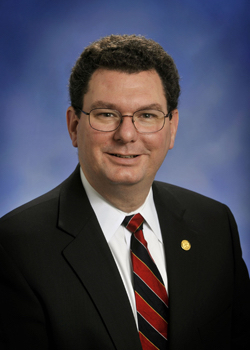PRO Michigan's Electoral College split: A return to relevancy
Michigan deserves a louder voice in presidential elections
Every four years voters in the United States get their chance to choose who will be the next leader of our great nation. On that first Tuesday in November, these men and women will go to their polling places and decide which candidate they most support. All of this follows months – sometimes years – of speeches, town halls, debates, advertisements and rallies.
However, due to the way our country elects its president, many voters, including those in Michigan, are passed over and not viewed as part of the “road to the White House.” Because of this, Michigan is forced to watch these candidates from afar as they dart across the country to states like Ohio, New Hampshire, Iowa, Colorado and Nevada, meeting with local residents, businesses and elected officials to discuss issues affecting their states.
What’s preventing Michigan, and most of the other states, from having the same influence over presidential elections as the five other states mentioned above? Simply put, while the winner-take-all Electoral College allocation has worked for some states, it has prevented Michigan from being competitive in presidential elections for decades. Since Michigan is viewed as uncompetitive, candidates do not see a reason to spend time connecting with Michigan voters and speaking to issues that are most important for our state.
What can be done to make Michigan a more competitive state for these elections? My current plan – HB 5974 – puts more electoral votes in play for the candidates, rewarding candidates who put in the effort to earn more votes from our state while creating electoral consequences for candidates who choose to forgo Michigan during their campaign.
One of the main criticisms this bill has received so far is the logical fallacy that the winner of our state receiving fewer electoral votes will diminish our impact and create even less of an incentive for candidates to spend time here. While logic would say more electoral votes equals more incentive to visit here, that has proven to not be the case here in Michigan.
Of the states listed above, only Ohio has more electoral votes than Michigan; in fact, Iowa, New Hampshire and Nevada have the same number of electoral votes combined as Michigan, yet during the last election cycle each state was visited by the presidential campaigns more than Michigan in the final five months of the campaign. Out of those three states, Nevada had the fewest visits during the last five months preceding the election, and they still had double the amount of Michigan. Even Colorado, a state which has seven fewer electoral votes than Michigan, received a significantly larger number of visits from presidential candidates.
What’s more, critics have been using faulty math when discussing the plan. One such example is that the plan would only put two to four electoral votes up for grabs in Michigan. However, this is simply not the case. For example, if the plan was in effect for the 2012 election, we would’ve seen a 12-4 split, rather than all 16 going to the winner. While this may not look like much, in reality that is an eight-vote swing, offering more influence than Iowa, New Hampshire or Nevada. Even in the 2008 election, this plan would have created a six-vote swing, equal to the number of votes up for grabs in Iowa and Nevada and still more than New Hampshire.
The simple fact here is the winner-take-all system for allocating Michigan’s electoral votes doesn’t work for our voters. Michigan is an incredibly diverse state, and our issues need to receive more attention than they currently get from presidential candidates. We can’t continue to be a state candidates feel they can skip on their way to 270 electoral votes. This proposal is a good way to get these candidates to spend time in Michigan, raising the national profile of our great state and garnering more national attention for the issues affecting us every day.
We don’t have to sit on the sidelines while other states get the kind of focus and attention on their issues that we deserve as well. It’s time to tell presidential candidates what we already know: Michigan matters, and this proposal will lend a louder voice to voters in this state during presidential elections.
CON Michigan's Electoral College split: A spiteful rule change
See what new members are saying about why they donated to Bridge Michigan:
- “In order for this information to be accurate and unbiased it must be underwritten by its readers, not by special interests.” - Larry S.
- “Not many other media sources report on the topics Bridge does.” - Susan B.
- “Your journalism is outstanding and rare these days.” - Mark S.
If you want to ensure the future of nonpartisan, nonprofit Michigan journalism, please become a member today. You, too, will be asked why you donated and maybe we'll feature your quote next time!


 Pete Lund represents the 36th House district and serves as chair of the House Insurance Committee and Government Operations Committee.
Pete Lund represents the 36th House district and serves as chair of the House Insurance Committee and Government Operations Committee.